Daily Vocabulary Words: List of Daily Used Words in Leading International Newspapers
Hi there. Welcome to this special section @ Wordpandit.
Our endeavour here is very simple: to highlight important daily vocabulary words, which you would come across in leading newspapers in the country. We have included the following newspapers in our selection:
• The New York Times
• The Washington Post
• Scientific American
• BBC
• The Guardian
• Psychology Today
• Wall Street Journal
• The Economist
We are putting in extensive work for developing your vocabulary. All you have got to do is be regular with this section and check out this post on a daily basis. This is your repository of words that are commonly used and essentially, we are posting a list of daily used words. Hence, this has significant practical application as it teaches you words that are used commonly in leading publications mentioned above.
Visit the website daily to learn words from leading international newspapers.
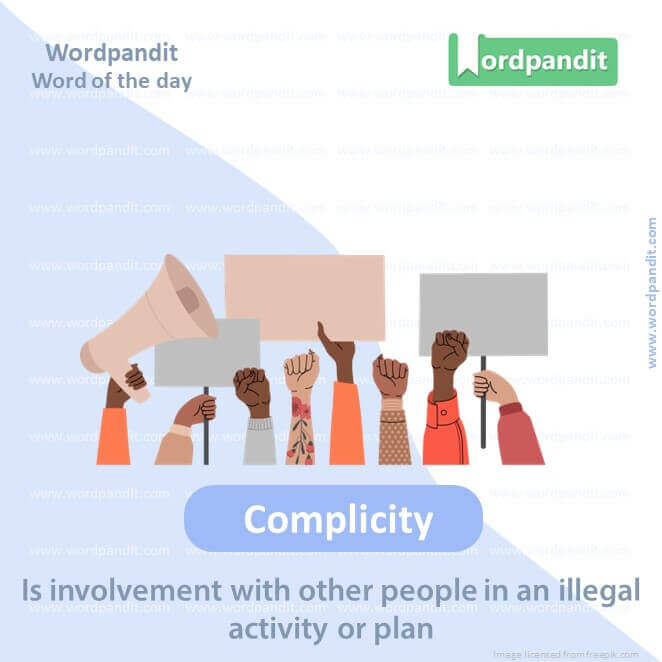
WORD-1: COMPLICITY
CONTEXT: “The investigative report uncovered evidence of complicity among high-ranking officials, revealing a web of corruption that reached the highest levels of government.”
SOURCE: The Washington Post
EXPLANATORY PARAGRAPH: Complicity is when you do something wrong with someone else. It’s like when you and your friend secretly eat cookies before dinner, even though you’re not supposed to. You both did it together, so you’re both in trouble. That’s what complicity means, doing something naughty together.
MEANING: Is involvement with other people in an illegal activity or plan (noun).
PRONUNCIATION: kuhm-PLIS-uh-tee
SYNONYMS: Involvement, collusion, partnership, association, connivance, conspiracy, cooperation
USAGE EXAMPLE:
1. The two friends were caught in complicity when they both skipped school together.
2. The police suspected complicity among the employees in the theft of the valuable painting.
3. Jane felt guilty due to her complicity in cheating on the test with her classmates.
4. Complicity in the prank made everyone in the class share the consequences.
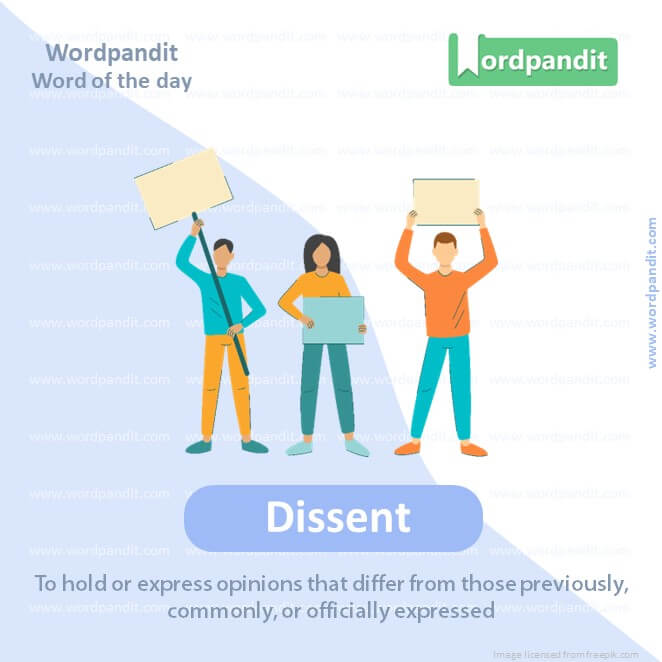
WORD-2: DISSENT
CONTEXT: “In a climate of growing dissent, protesters took to the streets to voice their opposition to the controversial new policies, demanding a more inclusive approach.”
SOURCE: The Guardian
EXPLANATORY PARAGRAPH: Dissent means saying “no” or disagreeing when everyone else says “yes” or agrees. It’s like when your friends want to play tag, but you want to play hide and seek. You have a different idea, and that’s called dissent. It’s okay to have your own ideas and say them out loud.
MEANING: To hold or express opinions that differ from those previously, commonly, or officially expressed (verb/noun).
PRONUNCIATION: dih-SENT
SYNONYMS: Disagreement, objection, dispute, disagreement, opposition, resistance, defiance
USAGE EXAMPLE:
1. Tom had the courage to dissent and express his opinion, even when others disagreed.
2. The class had a dissenting voice when they voted on the field trip destination.
3. Dissent is an important part of democracy, allowing people to express different opinions.
4. She chose to dissent and protest against the unfair rules.
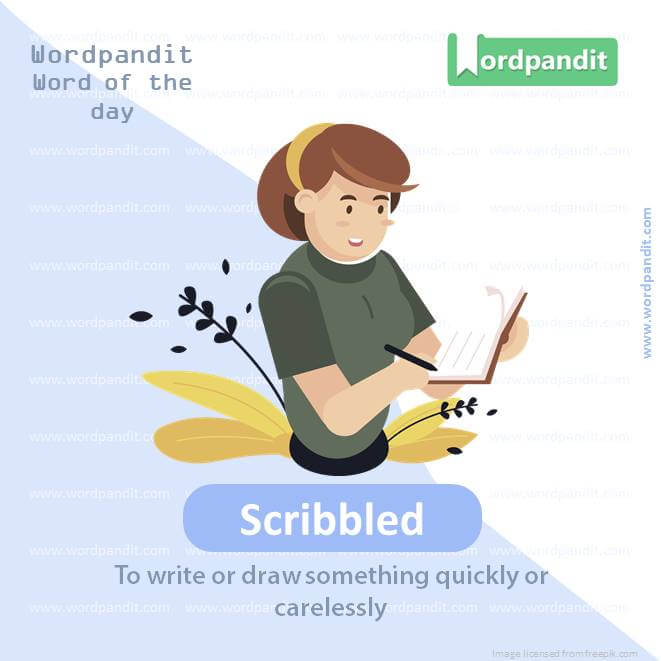
WORD-3: SCRIBBLED
CONTEXT: “The hastily scribbled notes in the margins of the research paper turned out to be a breakthrough discovery that challenged the established theories.”
SOURCE: Scientific American
EXPLANATORY PARAGRAPH: Scribbled means drawing or writing something quickly and messily, like when you use colorful crayons and draw squiggly lines all over your paper. It’s like doodling or making messy notes on your homework.
MEANING: To write or draw something quickly or carelessly (verb/adjective).
PRONUNCIATION: SKRIB-uhld
SYNONYMS: Doodled, scrawled, jotted, sketched, hastily written, hastily drawn
USAGE EXAMPLE:
1. Tim scribbled a funny picture in his notebook during class.
2. She scribbled down the phone number on a piece of scrap paper.
3. The note was so scribbled that it was hard to read.
4. The artist scribbled his ideas on a napkin while waiting for his food.
WORD-4: MODUS OPERANDI
CONTEXT: “Law enforcement agencies were puzzled by the criminal’s modus operandi, which seemed to change with each heist, making it difficult to predict their next move.”
SOURCE: The Economist
EXPLANATORY PARAGRAPH: Modus Operandi is a fancy way of saying “how someone does things.” It’s like knowing that your friend always wears a hat when it’s sunny. That’s their way of protecting themselves from the sun. So, the way they wear a hat is their modus operandi for staying cool.
MEANING: The way someone usually does things or a criminal’s typical method (noun).
PRONUNCIATION: MOH-dus ah-PUR-an-dee
SYNONYMS: Method, approach, procedure, technique, strategy, tactic, way of doing things
USAGE EXAMPLE:
1. The detective studied the criminal’s modus operandi to catch them.
2. Sarah had a specific modus operandi for solving math problems.
3. Learning the modus operandi of a new game can be challenging.
4. Understanding the modus operandi of a business can help it succeed.
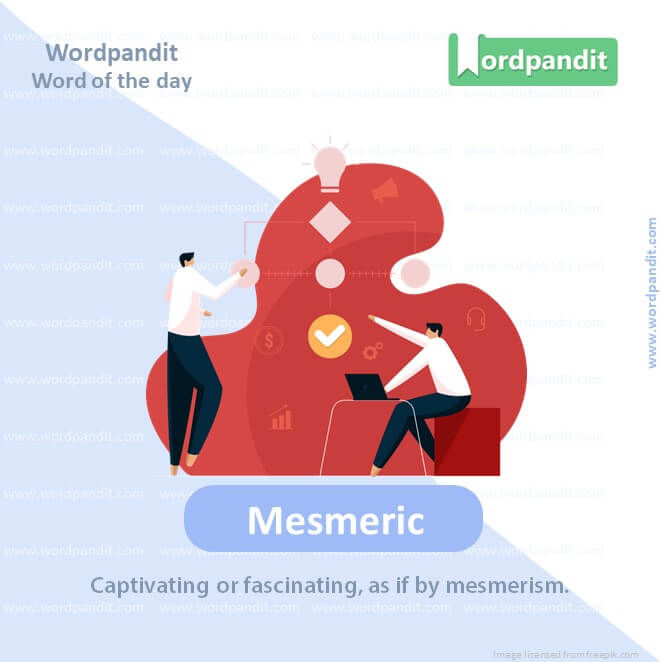
WORD-5: MESMERIC
CONTEXT: “The mesmeric performance by the renowned pianist left the audience in awe, as they were transported to a world of musical enchantment.”
SOURCE: The New York Times
EXPLANATORY PARAGRAPH: Mesmeric means something is so captivating that you can’t look away, like a magician doing cool tricks or watching colorful fireworks light up the sky. It’s like being in a trance, where you forget everything else because you’re so captivated by what’s happening.
MEANING: Captivating or fascinating, as if by mesmerism. (adjective).
PRONUNCIATION: mez-MER-ik
SYNONYMS: Hypnotic, enchanting, entrancing, captivating, spellbinding, enthralling, mesmerizing
USAGE EXAMPLE:
1. The mesmeric dance performance held the audience’s attention from start to finish.
2. The beautiful sunset over the ocean was truly mesmeric.
3. The storyteller’s mesmeric tales kept the children spellbound.
4. The mesmeric artwork in the gallery left everyone in awe.
WORD-6: GLITTERING
CONTEXT: “The city’s skyline at night, with its glittering skyscrapers, has become an iconic symbol of prosperity and urban development.”
SOURCE: BBC
EXPLANATORY PARAGRAPH: Glittering means something is shining really bright, like when you wear your sparkly shoes and they catch the sunlight. It’s like having tiny stars or diamonds on it that make it look extra special and pretty.
MEANING: Shining and sparkling brightly, like a diamond or a star (adjective).
PRONUNCIATION: GLIT-uh-ring
SYNONYMS: Sparkling, glistening, shining, radiant, dazzling, gleaming, scintillating
USAGE EXAMPLE:
1. Her glittering dress made her look like a princess at the ball.
2. The night sky was filled with glittering stars.
3. The river sparkled with glittering reflections of the sun.
4. The treasure chest was full of glittering jewels and coins.
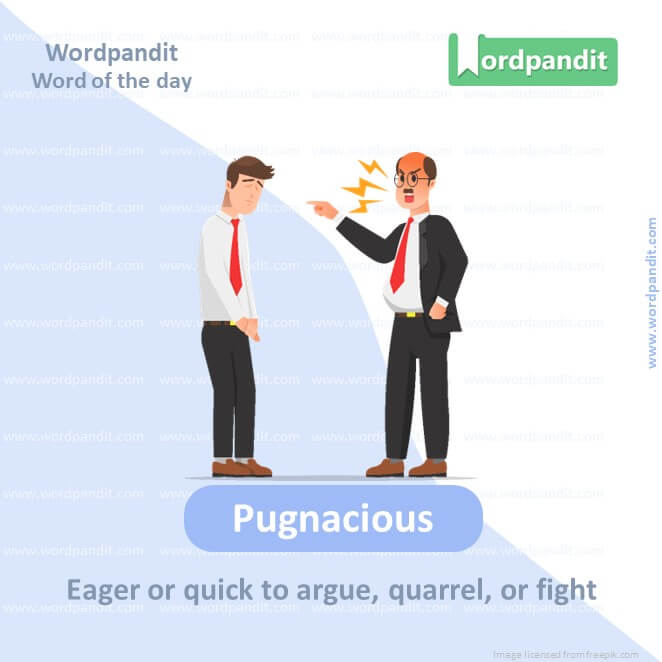
WORD-7: PUGNACIOUS
CONTEXT: “The pugnacious debate in the parliament descended into shouting matches, as lawmakers fiercely clashed over the contentious bill.”
SOURCE: The Washington Post
EXPLANATORY PARAGRAPH: Pugnacious means someone who likes to fight or argue a lot, like a feisty little puppy who always wants to play-fight. It’s important to be friendly and not pugnacious, so people like being around you.
MEANING: Eager or quick to argue, quarrel, or fight (adjective).
PRONUNCIATION: pug-NAY-shus
SYNONYMS: Combative, aggressive, quarrelsome, belligerent, confrontational, contentious, bellicose
USAGE EXAMPLE:
1. His pugnacious attitude often led to conflicts with his classmates.
2. The pugnacious dog would always challenge other dogs in the park.
3. She had a pugnacious personality that made it hard to have peaceful conversations.
4. The pugnacious debate became quite heated.
WORD-8: INDOCTRINATION
CONTEXT: “Concerns were raised about the potential for ideological indoctrination in educational institutions, prompting a national conversation on academic freedom.”
SOURCE: Al Jazeera
EXPLANATORY PARAGRAPH: Indoctrination is when someone tries to teach you something, but they only want you to believe one way and don’t let you think for yourself. It’s like when someone tells you that a certain toy is the best, and you should only play with that toy, and nothing else. Indoctrination is when people try to make you believe what they believe, without letting you decide for yourself.
MEANING: Teaching someone to believe in a particular way, often without letting them question or think for themselves (noun).
PRONUNCIATION: in-DAHK-truh-NAY-shun
SYNONYMS: Brainwashing, propaganda, manipulation, conditioning, grooming, inculcation, influence
USAGE EXAMPLE:
1. The cult used indoctrination to control its members’ beliefs and actions.
2. The government’s propaganda aimed at indoctrination rather than free thinking.
3. The school emphasized critical thinking over indoctrination.
4. Some movies warn about the dangers of indoctrination by showing characters who break free from it.
WORD-9: PIVOTAL
CONTEXT: “The pivotal moment in the negotiations came when both parties finally reached a consensus on the key issues, paving the way for a historic peace agreement.”
SOURCE: The Guardian
EXPLANATORY PARAGRAPH: Pivotal means something is super important and can make a big difference, like the middle of a seesaw. If you move it, the whole seesaw goes up or down. So, when something is pivotal, it’s like the most important part that can change everything.
MEANING: Extremely important or critical, like the most important piece in a puzzle (adjective).
PRONUNCIATION: PIV-uh-tuhl
SYNONYMS: Crucial, essential, central, significant, vital, key, decisive
USAGE EXAMPLE:
1. The captain’s decision was pivotal to the team’s success in the game.
2. Her research was pivotal in finding a cure for the disease.
3. The pivotal moment in the story changed everything for the characters.
4. Good communication is pivotal in maintaining healthy relationships.
WORD-10: SOARING
CONTEXT: “With the economy rebounding, the stock market saw soaring gains, reflecting investor confidence in the country’s financial stability.”
SOURCE: The New York Times
EXPLANATORY PARAGRAPH: Soaring means going really, really high up in the sky, like a bird or an airplane. It’s like when you imagine yourself floating above the clouds. When something is soaring, it’s like it’s flying up high, reaching for the sky.
MEANING: Flying or rising high up in the air, like a bird or a kite (adjective).
PRONUNCIATION: SOH-ring
SYNONYMS: Flying, ascending, climbing, rising, skyrocketing, ascending, high-flying
USAGE EXAMPLE:
1. The eagle was soaring in the sky, searching for its prey.
2. The kite went soaring into the air when they let go of it.
3. The company’s stock price was soaring after the successful product launch.
4. With his new wingsuit, he could experience the sensation of soaring like a bird.
Vocabulary Spelling
Language acquisition is a mosaic where different elements, including ‘vocabulary spelling’, come together to make a complete picture. Knowing a word’s meaning is just half the battle; the ability to spell it correctly completes the understanding. Hence, a systematic and diligent approach to grasping ‘vocabulary spelling’ is key to language mastery.
Starting with ‘vocabulary spelling’, it’s recommended to begin with words you frequently use but are unsure of their spelling. Write down these words, observe their spelling patterns, and pronounce them out loud. Getting the grip of commonly used ‘vocabulary spelling’ can significantly enhance your written communication.
In the journey of learning ‘vocabulary spelling’, phonetic understanding can be remarkably beneficial. Words are often spelled as they sound. Therefore, breaking down the word phonetically and pronouncing it can assist in remembering the spelling.
‘Vocabulary spelling’ learning can be further enhanced with fun techniques like spelling games or quizzes. Such activities provide an enjoyable yet effective way to learn and reinforce spelling.
Moreover, practice is a powerful catalyst in mastering ‘vocabulary spelling’. Regular writing exercises using new vocabulary can solidify their spelling in your memory. As the adage goes, “practice makes perfect,” holds very well for ‘vocabulary spelling’ too.
In the digital age, numerous resources are available at our fingertips to improve ‘vocabulary spelling’. Spelling apps, online language platforms, and spell-check tools can be a great help in practicing and learning the correct spelling of various words.
To conclude, while ‘vocabulary spelling’ leaning might seem mundane or challenging, with the right strategies and consistent effort, it becomes achievable and engaging. Whether it’s through phonetic understanding, continuous practice, or leveraging digital tools, every stride put forth in learning ‘vocabulary spelling’ takes you a step closer to language fluency and proficiency.











